Medical Coding Skills For Your Resume (With Examples)
For this blog post, we researched actual medical coder job openings and asked professionals within the space to find out the most important skills to include in your resume.

75% of resumes get rejected before they reach a hiring manager.
This statistic exists due to the job recruiter’s favorite tool, the applicant tracking system (ATS). These tools collect, scan, sort and rank resumes in real-time as they come in. They’re the reason why every online application requires you to copy and paste your entire resume into different forms.
They’re also why the majority of applicants don’t get reviewed by an actual human being.
Maybe you’re an enthusiastic up-and-coming medical coder who just passed all of your tests. Or you’re a seasoned expert within this field and want to find a new place to work at.
Either way, the fact I just mentioned is pretty demotivational, isn’t it?
It doesn’t help to know that over 98% of Fortune 500 companies use an ATS and many smaller companies swear by them as well.

I’m not trying to dismay your enthusiasm with these facts, I promise. I’m merely pointing out the reality that medical coding applicants face before landing their desired salary.
Luckily, this is a problem that everyone applying for a job has to overcome, regardless of position or industry.
This means that there are ways to navigate past these systems and guarantee that your application gets reviewed by a recruiter or human resources manager.
An ATS looks at your resume’s format and whether or not you have any typos, of course. More importantly, though, the system ranks applicants based on keywords. In other words, if your resume doesn’t contain any references to what the organization listed within the job description, your application will get rejected automatically.
This also means that the job application process isn’t stagnant anymore. It requires you to organically change your resume based on what the job you’re applying for is asking for.
But what areas should you adjust? It’s not like you can change what school you went to or the places you’ve worked.
Well, the majority of employers admit that the skills section is the most important part of a resume. That’s the section where everyone talks about how great of a leader they are and that they’re a “go-getter”.
That last sentence in the paragraph above is satirical. My point is that many people put generic buzzwords and phrases there to sound prolific. Even I’ve done that before.
But, let’s get back to the matter at hand. For this blog post, we researched actual medical coder job openings and asked professionals within the space to find out the most important skills to include in your resume.
Skill #1: Attention to Detail
In a Facebook group of over 38,000 current and aspiring medical coders, we asked what they thought was the most important skill to have at their position. Over 20 of their most active members gave us their insight.
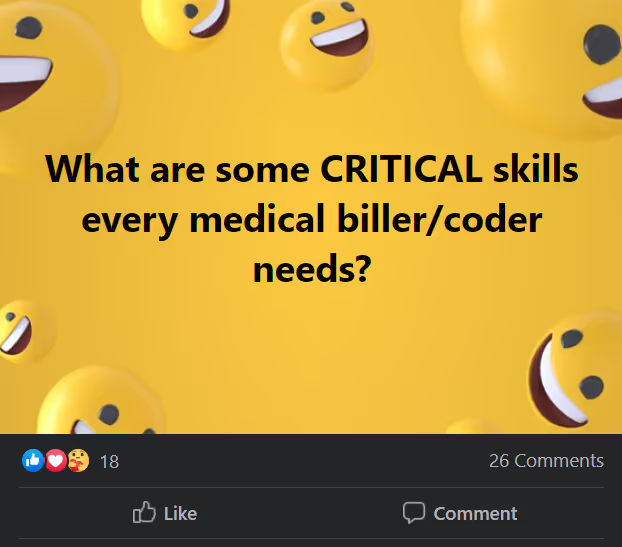
5 practicing professionals who commented mentioned attention to detail. As a result, we’ve placed it at #1 on our list.
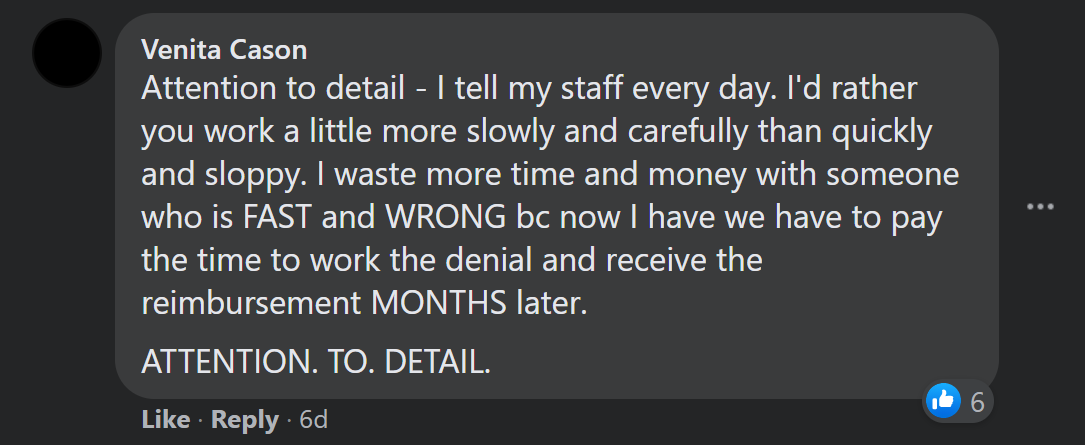
Here’s why they say it’s so important.
Medical coding is all about transforming healthcare diagnoses and treatments into their alphanumeric counterparts. These codes then define how much to charge a patient for what they received.
This means that a coder needs to look at all of the information gathered during an appointment and define it accurately. In other words, you have to translate ineligible doctor’s notes and interpret laboratory results. Any errors during this process leads to denials by insurance providers and less revenue for the practice you work for. There’s a lot of outside pressure during this process.
OK, I say all of this but do healthcare organizations actively seek out this skillset in their candidates?
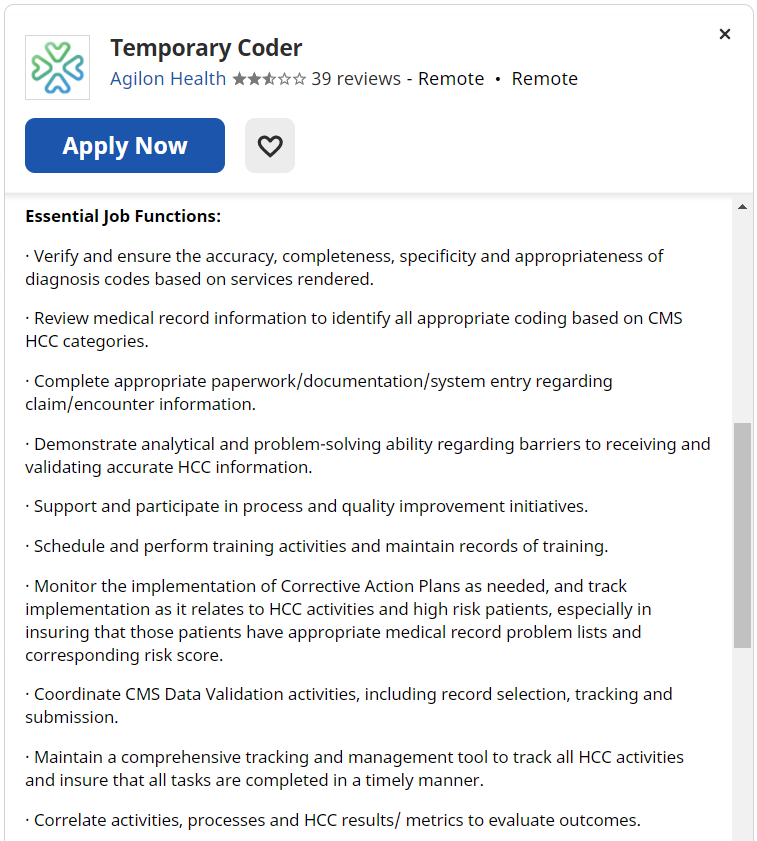
The screenshot above is an active medical coding job opening at the time of writing from Agilon Health.
Nothing in this job description comes right out and says “attention to detail”. However, certain parts of it hint towards that’s what this organization values most.
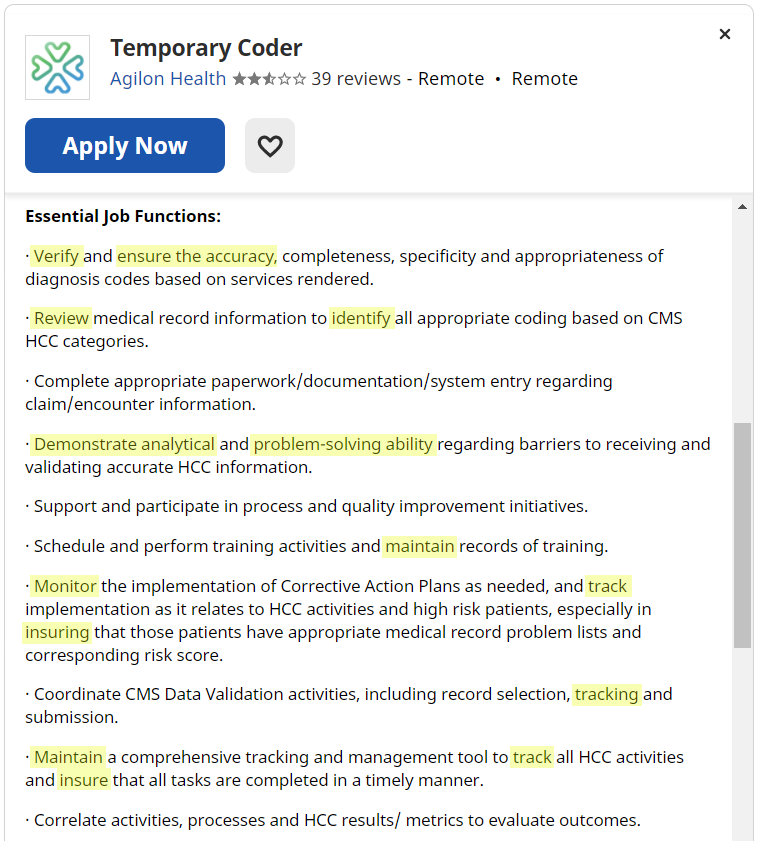
Agilon Health listed ten essential functions so that their applicants know what’s expected of them should they land the job. My analysis found that 14 different action phrases listed within this section requires that their candidate have a high attention to detail in order to qualify as a good applicant.
Now, placing “high-attention to detail” within the skills section of your resume probably isn’t enough to qualify to land this job. You also have to prove that that is a skill you actually have by proving it within your experience section.
Skill #2: Critical Thinking
The majority of medical coders work either for a healthcare conglomerate that provides outsourcing services to thousands of practices. That means that there’s a never-ending amount of work to go through daily.
Yes, artificial intelligence systems exist that make this job easier. These systems even scare some people into thinking that medical coding is a dying career (it’s not going anywhere).
Technology won’t ever be able to outmatch the intuition of an experienced coder, though.
Thus, our second most important skill to list on your resume is critical thinking.

Current professionals within the Facebook group from earlier mentioned critical thinking 4 times throughout their replies.
Essentially everything that can happen to you medically has a corresponding ICD-10 (soon to be ICD-11) code. Currently, medical coders choose from 70,000 possible alphanumeric classifications under ICD-10.
ICD-11 adds over 200,000 new possibilities to that existing number.
As a result, classifications might only vary slightly based on specificity. Was the patient struck by a fish? Then they’re classified under W56.22XS. If the fish that struck the patient was an orca, though, then they’re classified further. It’s possible that the specifics weren’t included in any of the doctor’s notes. After all, how could anyone expect a doctor to ask what kind of fish struck their patient?
However, those details matter in medical coding and they’re only achievable through critical thinking skills.
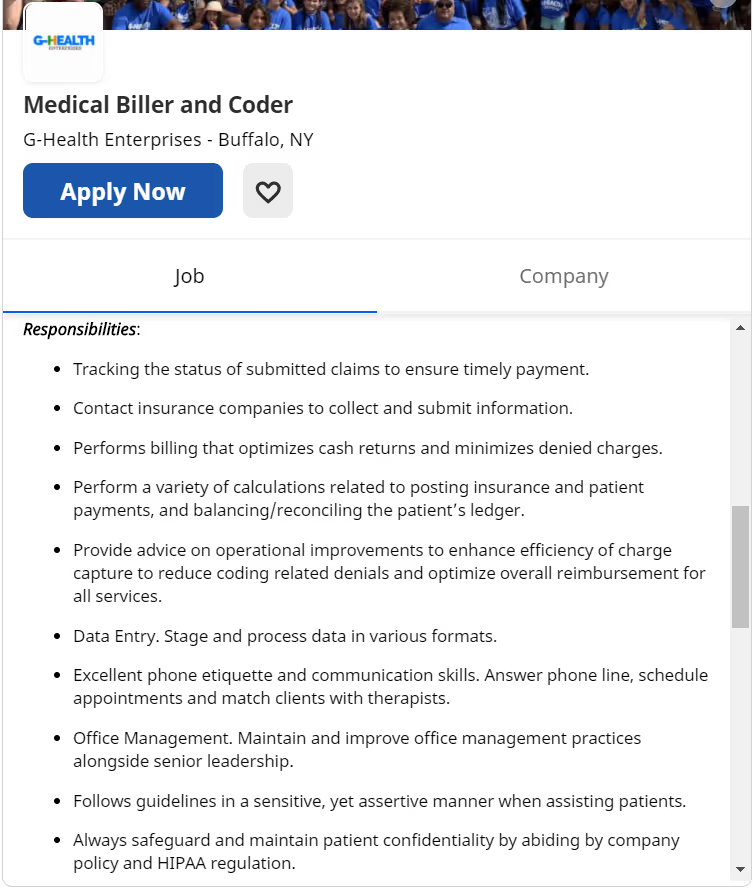
A job opening at G-Health reinforces that critical thinking is a highly sought after skill for these positions.
Just like the last example, you want to look at and interpret the responsibilities section. Only from this section of a job description can you determine the type of individual they’re looking for.
You shouldn’t ignore the requirements section either. However, there’s not much you can do to your resume if you don’t fit everything that’s listed there. If you don’t have 5 years of experience and it’s a requirement, there’s nothing you can do. You should still apply because you might be a great fit nonetheless, though.

After analyzing the responsibilities G-Health assigns to their medical coders, I noticed that they place a high value on critical thinking.
They listed 10 core responsibilities and critical thinking is sought after 8 times.
They also put a high value on detail orientation but I’ll leave it up to you find what’s related to that.
Skills #3 and #4: Time Management and Prioritization
Of course time management lands on our list of medical coding skills you should add to your resume. After all, Linkedin named it the fifth most important skill for landing a job in 2019.
Why is it ranked higher on our list?
Well, there’s a time limit placed on healthcare claims, in case your workload already wasn’t enough. These are notoriously called timely filing limits.
Insurance companies place a time limit on when they’ll accept a claim. They kick off this process as soon as an appointment concludes. They refer to this as “point of service”.
If you’re the coder and you take too long to get through your pile of work, it’s likely some of the claims you work through will go past their accepted time window. As a result, you’d submit the claim and the insurance company would immediately deny it.
To solve that issue healthcare organizations also place a high value on the ability to prioritize.

You need to be able to look at your work queue and complete everything assigned to you. It all has to happen in such a way that you’re keeping timely filing limits in mind, which requires individualized prioritization.
The group I asked mentioned prioritizing and time management 3 times in their responses.
Now, of course, we need to see if there’s any proof behind the importance of this skill.
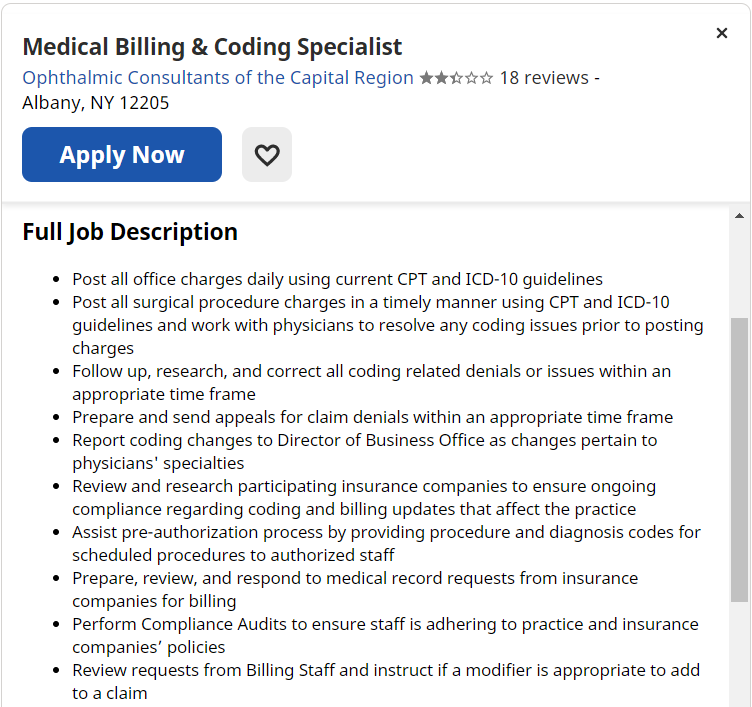
By now I should mention that medical coding and billing closely relate to one another. As a result, many positions that organizations ask for expect their candidates to be proficient in both areas.
Of course, some of the earlier examples also showed how important time management and prioritization are in the health IT space. But Ophthalmic Consultants of the Captial Region place a special emphasis on those two skills.
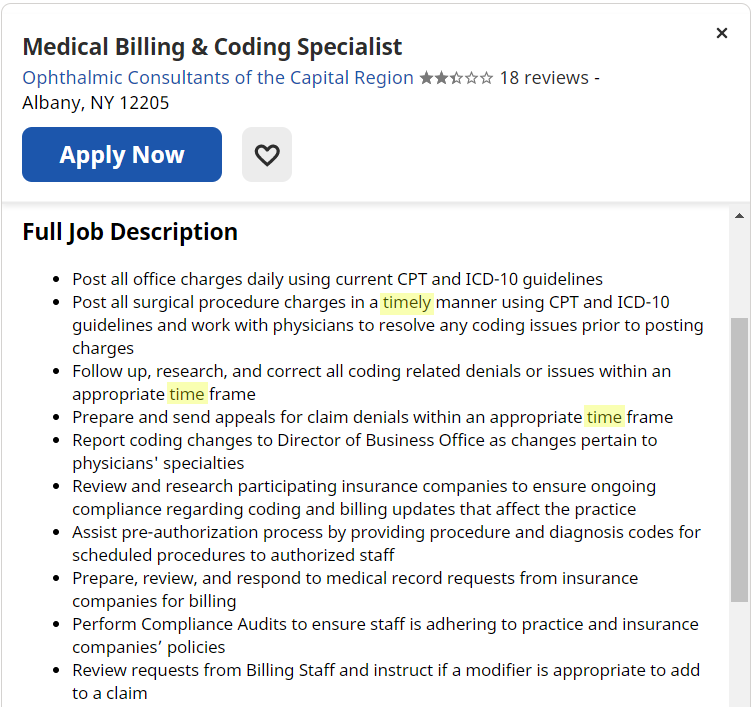
Their posting mentions time 3 separate times throughout their 10 listed responsibilities. Even if the organization you’re applying for doesn’t list prioritization or time management, it’s still an essential skill to add.
The odd adage, “time is money” still holds in the medical coding space.
Skill #5: Adherence
Every organization and position within healthcare has to follow certain guidelines and policies.
Of course, there’s the Health Insurance Portability and Accountability Act (HIPAA) but there’s also going to be a book of policies specific to the organization you choose to work for.
As a result, organizations want candidates who don’t have a problem committing to the rules.

But adherence in medical coding goes beyond compliance and internal policies. There are also certain rules and guidelines that you can’t ignore.
For example, duplicate billing happens more often than most organizations want to admit. This occurs when the coder and/or biller sends the same bill twice to the same patient over the same treatment. Charging for the wrong service also falls under duplicate billing.
As always, let’s look at the requirements section from some open positions.
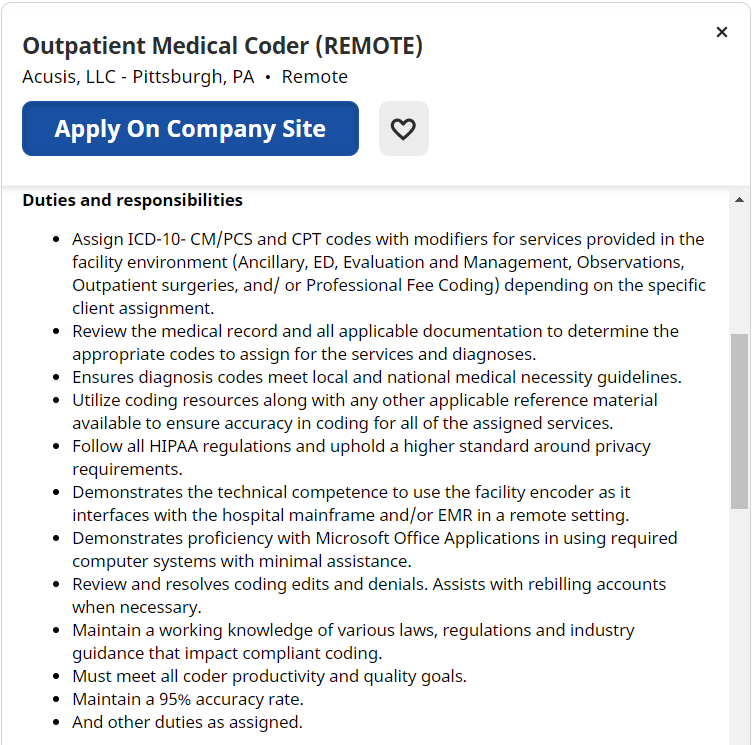
Acusis, LLC. wants someone with prior experience for their remote outpatient medical coder position. You can tell without going into the requirements section of their listing.
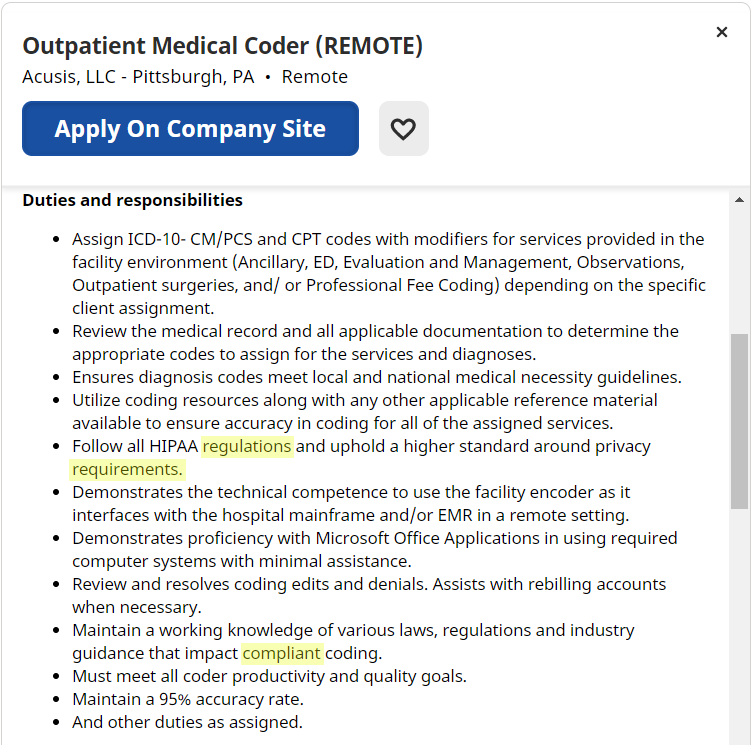
This position mentions words related to adherence 3 times within their 12 listed responsibilities.
People who are just starting to land a position within this industry are familiar with HIPAA regulations. But, learning the laws in’s and out’s happens while on the job.
Conclusion
This blog post is to serve you as a guide toward making a resume that ranks at the top of others within an ATS.
Listing each skill I’ve mentioned here isn’t a solve-all. However, if you’ve read through it all then you’ve also learned how important it is to look at and analyze the responsibilities section of every listing.
It’s only within that section that you understand what qualities the organization want in their candidates. Once you’ve realized what they want, you can then adjust your resume to match using keywords. Then, it’s only a matter of time before they call you expressing interest in an interview.
You have the medical coding skills to land a job, now it’s just a matter of reflecting them the right way within your resume.
Emphasize your product's unique features or benefits to differentiate it from competitors
In nec dictum adipiscing pharetra enim etiam scelerisque dolor purus ipsum egestas cursus vulputate arcu egestas ut eu sed mollis consectetur mattis pharetra curabitur et maecenas in mattis fames consectetur ipsum quis risus mauris aliquam ornare nisl purus at ipsum nulla accumsan consectetur vestibulum suspendisse aliquam condimentum scelerisque lacinia pellentesque vestibulum condimentum turpis ligula pharetra dictum sapien facilisis sapien at sagittis et cursus congue.
- Pharetra curabitur et maecenas in mattis fames consectetur ipsum quis risus.
- Justo urna nisi auctor consequat consectetur dolor lectus blandit.
- Eget egestas volutpat lacinia vestibulum vitae mattis hendrerit.
- Ornare elit odio tellus orci bibendum dictum id sem congue enim amet diam.
Incorporate statistics or specific numbers to highlight the effectiveness or popularity of your offering
Convallis pellentesque ullamcorper sapien sed tristique fermentum proin amet quam tincidunt feugiat vitae neque quisque odio ut pellentesque ac mauris eget lectus. Pretium arcu turpis lacus sapien sit at eu sapien duis magna nunc nibh nam non ut nibh ultrices ultrices elementum egestas enim nisl sed cursus pellentesque sit dignissim enim euismod sit et convallis sed pelis viverra quam at nisl sit pharetra enim nisl nec vestibulum posuere in volutpat sed blandit neque risus.

Use time-sensitive language to encourage immediate action, such as "Limited Time Offer
Feugiat vitae neque quisque odio ut pellentesque ac mauris eget lectus. Pretium arcu turpis lacus sapien sit at eu sapien duis magna nunc nibh nam non ut nibh ultrices ultrices elementum egestas enim nisl sed cursus pellentesque sit dignissim enim euismod sit et convallis sed pelis viverra quam at nisl sit pharetra enim nisl nec vestibulum posuere in volutpat sed blandit neque risus.
- Pharetra curabitur et maecenas in mattis fames consectetur ipsum quis risus.
- Justo urna nisi auctor consequat consectetur dolor lectus blandit.
- Eget egestas volutpat lacinia vestibulum vitae mattis hendrerit.
- Ornare elit odio tellus orci bibendum dictum id sem congue enim amet diam.
Address customer pain points directly by showing how your product solves their problems
Feugiat vitae neque quisque odio ut pellentesque ac mauris eget lectus. Pretium arcu turpis lacus sapien sit at eu sapien duis magna nunc nibh nam non ut nibh ultrices ultrices elementum egestas enim nisl sed cursus pellentesque sit dignissim enim euismod sit et convallis sed pelis viverra quam at nisl sit pharetra enim nisl nec vestibulum posuere in volutpat sed blandit neque risus.
Vel etiam vel amet aenean eget in habitasse nunc duis tellus sem turpis risus aliquam ac volutpat tellus eu faucibus ullamcorper.
Tailor titles to your ideal customer segment using phrases like "Designed for Busy Professionals
Sed pretium id nibh id sit felis vitae volutpat volutpat adipiscing at sodales neque lectus mi phasellus commodo at elit suspendisse ornare faucibus lectus purus viverra in nec aliquet commodo et sed sed nisi tempor mi pellentesque arcu viverra pretium duis enim vulputate dignissim etiam ultrices vitae neque urna proin nibh diam turpis augue lacus.




